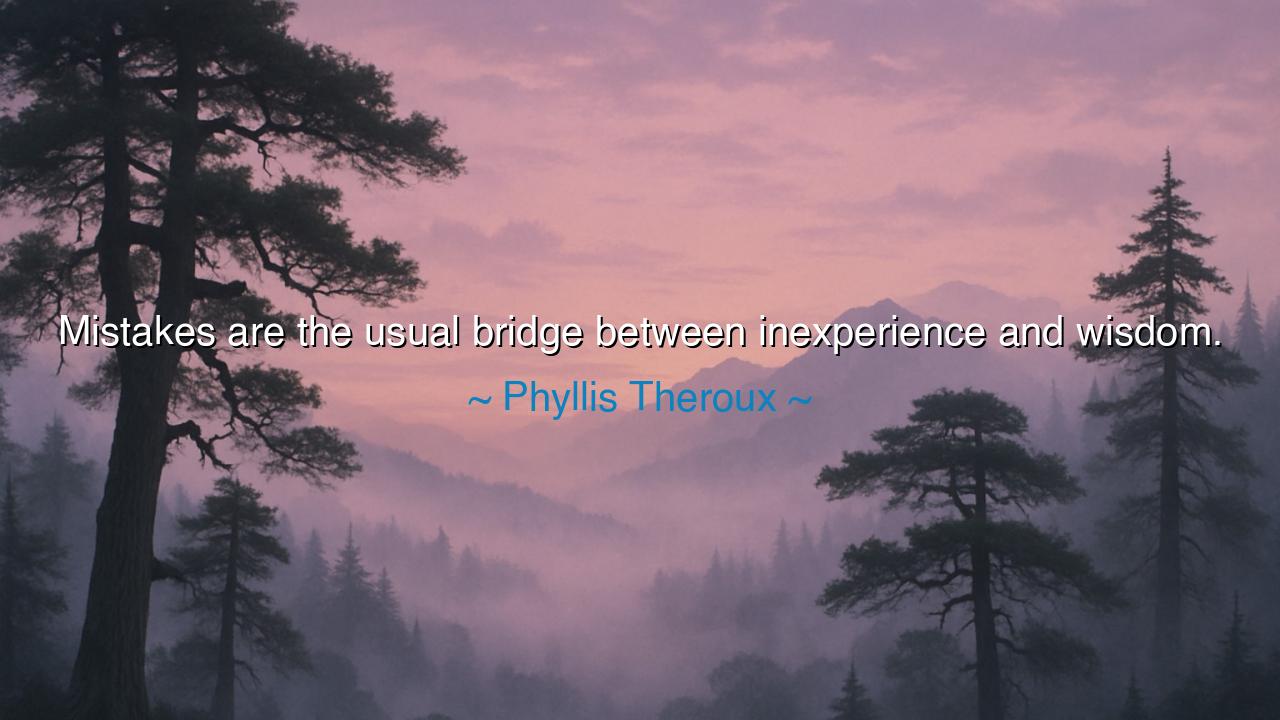
Mistakes are the usual bridge between inexperience and wisdom.






“Mistakes are the usual bridge between inexperience and wisdom.” These profound words from Phyllis Theroux reflect a timeless truth about the journey of learning and growth. Mistakes, though often feared and avoided, are the necessary steps we take toward wisdom. They are not failures but rather lessons in disguise, teaching us what we did not know and guiding us toward greater understanding. Just as the roots of a mighty tree grow deep through the struggle of the earth, so does wisdom arise from the struggle with mistakes. Without them, we would remain stagnant, forever imprisoned in our inexperience.
The ancients were acutely aware of the relationship between mistakes and wisdom. Socrates, the philosopher who sought truth through questioning, often emphasized that true knowledge came not from the answers we possess, but from the questions we ask and the mistakes we make along the way. He famously declared, "The only true wisdom is in knowing you know nothing." For Socrates, mistakes were not obstacles, but pathways to enlightenment. They were the means by which we cleared away the fog of ignorance and arrived at the clarity of understanding.
Consider the life of Thomas Edison, whose relentless pursuit of innovation was marked by countless mistakes. He failed thousands of times before he successfully invented the light bulb. Yet, rather than seeing his failures as setbacks, he viewed them as essential steps in the process of discovery. Edison’s perseverance in the face of mistakes is a testament to the idea that wisdom does not come from avoiding error, but from embracing it, learning from it, and using it to fuel future endeavors. His countless mistakes were not a hindrance but a bridge that led him to his greatest achievement.
The story of Albert Einstein further illustrates the relationship between mistakes and wisdom. Early in his life, Einstein struggled with conventional academic expectations, failing many times in traditional education. However, those early mistakes did not define him, nor did they diminish his potential. Instead, they taught him to think differently, to question established norms, and to view failure as a necessary part of the scientific process. It was through these mistakes that Einstein was able to develop the revolutionary theories of relativity, changing the course of modern physics.
Theroux’s insight echoes the wisdom of the ancients and modern innovators alike: mistakes are not just inevitable, but essential. They serve as the bridge between inexperience and wisdom, offering us the opportunity to reflect, to adjust, and to evolve. Each error, each misstep, is a teacher in its own right, offering valuable lessons that prepare us for the next challenge. To fear mistakes is to avoid the very process that leads to growth; to embrace them is to embrace the fullness of the human experience.
In conclusion, let us honor Theroux's reminder that mistakes are not the enemy of progress but its greatest ally. Like the ancients and the great thinkers of our time, we must recognize that wisdom is forged in the crucible of inexperience and failure. The road to wisdom is paved with mistakes, and it is through these mistakes that we become capable of seeing the world with deeper understanding and insight. Wisdom, therefore, is not a destination, but a journey marked by the lessons we learn along the way.






NDNhu Dang
This quote makes me think about mentorship and guidance. Could the bridge between inexperience and wisdom be shortened with the right support and feedback? I also question whether all mistakes are equally valuable—do some teach more about human behavior, ethics, or practical skills than others? How can individuals intentionally seek experiences that challenge them, knowing that mistakes along the way are part of the path to deeper understanding?
MNNguyen Man Nhi
Reading this, I consider the role of resilience in personal growth. Mistakes can be painful, but they appear necessary for developing insight and judgment. I wonder whether some people fear failure so much that they stagnate, missing the bridge to wisdom entirely. How can society cultivate environments where mistakes are treated as learning opportunities rather than solely as reasons for punishment or criticism?
DMDõ Duy Minh
This statement makes me question the cultural obsession with immediate competence. Does the pressure to perform perfectly limit our ability to gain real wisdom? I also wonder whether mistakes have different values depending on the context—are some mistakes more instructive than others? Could structured reflection on failures accelerate the transition from inexperience to wisdom, making the learning process more intentional?
MLVo Thi Mai Lan
I feel a mix of relief and anxiety reading this. It suggests that errors are natural and necessary, yet it also implies that inexperience inherently leads to mistakes. How can individuals navigate the tension between learning and avoiding harm, especially in high-stakes environments? I’m curious if the willingness to make mistakes might actually be a trait of wise people, enabling them to gain experience faster.
MKBui Mai Khoi
This quote makes me reflect on how society views failure. Often, mistakes are stigmatized, but this perspective frames them as essential stepping stones to wisdom. I wonder whether educational and professional systems do enough to encourage learning from errors, or if they push people toward avoiding mistakes at all costs. Could embracing mistakes more openly foster innovation and personal growth, rather than fear and perfectionism?